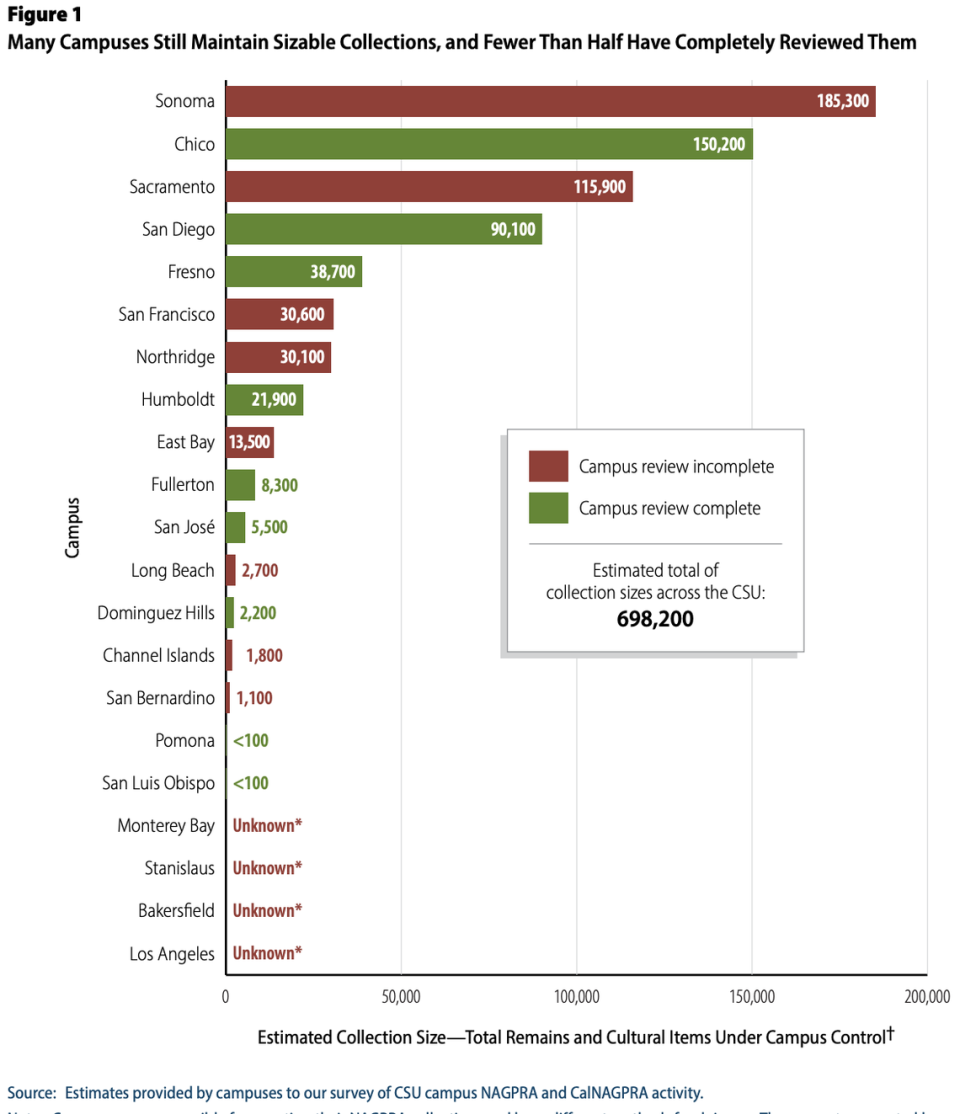Cal State schools have failed to return Native American remains, audit finds
The majority of California State Universities have failed to returned any Native American remains and cultural items to their tribes of origin despite a decades-long legal mandate to do so, according to a state audit released Thursday.
The 23-school system repatriated just 6% of nearly 700,000 collected human remains and cultural items, the report found. More than half of campuses haven’t even reviewed their collections for inventories they were ordered to complete by 1995.
“Campuses lack the policies, funding, and staffing necessary to follow the law and repatriate their collections. Factors such as these have contributed to the CSU system making little progress in the timely return of human remains and cultural items to tribes,” said California state auditor Grant Parks.
Some of California’s most prestigious universities continue to hold vast stores of Indigenous human remains, funeral objects and cultural items. Tucked away in basements of university anthropology and archaeology departments, tribes consider them a legacy of state-sponsored genocide against Native Americans that peaked during the Gold Rush.
The 1990 Native American Graves Protection and Repatriation Act, or NAGPRA, required institutions to return objects and human remains, including bones. But those efforts have dragged on for decades as universities question the links between tribes and artifacts.
CSU campuses have generally not prioritized the repatriation of their collections, and lack the policies, funding, and staffing necessary to follow NAGPRA and California’s own version of the law, CalNAGPRA, the report found.
After surveying all 23 campuses and conducting four on-site reviews, the office said the university system is risking financial penalties and reputational damage for not following the laws.

According to the audit, Sonoma State University has the largest collection of Native remains and cultural items in the CSU system, with 185,3000 items, but has not completed a review of its collection. Chico State is close behind with 150,200 items and zero repatriated.
Long Beach is the only campus that has returned a majority of its human remains and cultural artifacts, though many campuses that returned items did not properly consult with tribes. Sacramento State reported returning about 5% of its collection.
The audit recommended that all campuses complete a review of inventories by December 2024 and make sure that schools properly consult with tribes. The CSU chancellor said she will adopt all of the auditor’s counsel.
The system will enforce “appropriate oversight that will be vetted through Tribal consultation, require annual campus reporting of NAGPRA/CalNAGPRA activity and progress, and ensure adequate funding and resources,” said interim chancellor Jolene Koester.
In November, the auditor released its evaluation of the University of California’s compliance with Native repatriation laws and concluded that the UC “has not yet taken adequate action” to ensure the timely return of remains and artifacts.
Large institutions such as the University of California, Berkeley, have also received national attention for unrepatriated remains because. After leading the fields of anthropology and archeology over decades, they have enormous collections.
But smaller universities in the CSU system are seeing the same issues and delays, said Kerri Malloy, an enrolled member of the Yurok Tribe and assistant professor of Native American and Indigenous studies at San José State University.
“The California State University is a state agency, yet no additional funding came with this mandate. So each campus is having to move money and reallocate funds to do this,” said Malloy. “That’s getting harder as these budget situations get tighter.”
Earlier this week, a San José State anthropology professor who opposed repatriation posted a photo of herself in 2021 holding the skull of a Native American, agreed to resign.
For Malloy, the audit confirmed his belief that the CSU system hasn’t prioritized repatriation by giving it the funding and staffing required.
“You have to have somebody who’s dedicated to doing this and is able to build relationships with tribes,” Malloy said. “If you don’t have those individuals, you’re not going to complete the process.”


